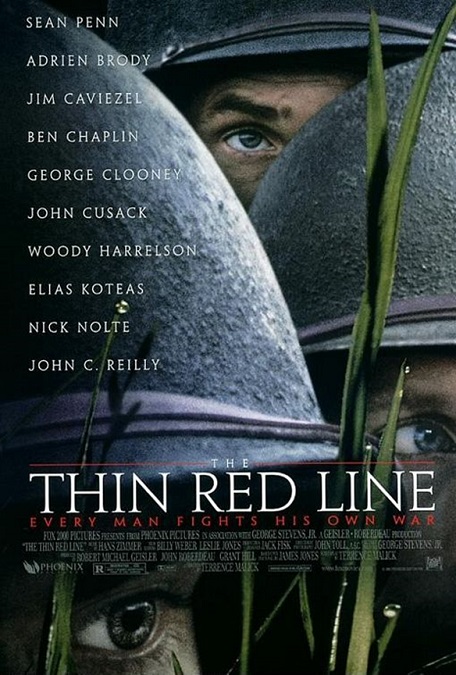
The Thin Red Line – 1998
I’ll start this review off by saying that this was not a bad movie. It wasn’t great, but it wasn’t bad. The problem is that it thought it was a boundlessly deep, profound, high-brow work of art, and it just wasn’t. In fact, it could have been incredible, but it was just boring and pretentious. The pacing was fifteen percent exciting, and eighty-five percent slow and dull. And most of the movie was just confusing for several specific reasons.
Ok, so it was a movie about the Battle of Mount Austin during WWII. This was part of the Guadalcanal campaign in the South Pacific. During this part of the war, American soldiers were fighting the Japanese instead of the Nazis. It had a long list of Hollywood stars in the cast, some having parts so small as to be considered cameos. In fact, in doing my research, I found that there were dozens of A-list actors desperate to get roles in this film. Big names like Robert De Niro, Robert Duvall, Tom Cruise, Brad Pitt, Al Pacino, Gary Oldman, Kevin Costner, Matthew McConaughey, Edward Norton, Philip Seymour Hoffman, Leonardo DiCaprio, and Nicholas Cage, none of whom were in the film, were aggressively pursuing the Director, Terrence Malick, for a chance to be in his movie.
But why? Why did all these superstars want to be in this war film? I’m not exactly certain, but I have a guess that might hold some truth. And it is this possible truth that might hold the key to everything. It might explain why the movie was so boring, and why it received seven Academy Award nominations, though it didn’t win a single one. It all has to do with Terrence Malick. Apparently, he is considered a true artist in an industry that is known for its lack of artfulness.
Malick had only made two films prior to The Thin Red Line. Then he took a long hiatus from filmmaking. When it became known that he would be directing again, everyone in Hollywood was tripping over themselves to work with him. Why? His works were noted for their lofty philosophical themes. According to Wikipedia, film scholar Lloyd Michaels says that Malick’s themes include “the isolated individual’s desire for transcendence amidst established social institutions, the grandeur and untouched beauty of nature, the competing claims of instinct and reason, and the lure of the open road.” Roger Ebert says that his films “have a unifying common theme: Human lives diminish beneath the overarching majesty of the world.”
But like many of Malick’s critics, I just found his movie incredibly pretentious and self-important. The movie screamed out to me, “Look at how deep and profound I am being. Look at how important my story of how war is a rape of nature is. Look at how my tales of human cruelties and suffering is emotional, tragic, and yet beautiful, all at the same time. Look at the imagery. Listen to the emotionally introspective voice-overs.” It was like the movie was trying so hard to be deep and artsy that it just came across as insufferable.
Anyway the three hour movie starred an ensemble cast made up of Jim Caviezel, Sean Penn, Elias Koteas, Ben Chaplin, Nick Nolte, Dash Mihok, John Cusack, Adrien Brody, John C. Reilly, Woody Harrelson, Jared Leto, John Travolta, George Clooney, Nick Stahl, and John Savage. I’m not even going to bother giving the names of the characters because the movie certainly didn’t make an effort to. For the most part, I followed them by their faces. There’s Nick Nolte. He’s a heartless bastard of a commander who spends most of his time screaming at his men. There is Ben Chaplin. He fights to stay alive so he can be reunited with his girlfriend. There is Jim Caviezel. He believes in the paradise of the afterlife. The characters are thrown up in front of you with no introductions, no back stories, and no character developments. As a result, when they started dying, I didn’t care, because I didn’t know who any of them were.
The movie is about how these soldiers have to accomplish the seemingly impossible task of capturing the heavily defended hill. Scores of American soldiers are slaughtered, and those who survive are reduced to screaming, sobbing, gibbering puddles of fear and madness. There is an interesting subplot in which Nolte orders Koteas take his men on a frontal assault of the bunkered hill. Koteas refuses the order because he knows it would be suicide. Later, after Cusack somehow takes a small party of volunteers to capture the bunker at the top of the hill, Nolte demotes Koteas and sends him to a desk job in Washington D.C.. Koteas’s men thank him for his bravery in standing up to the raving Nolte, knowing that in sacrificing his career, he saved their lives.
There were a few other barely interesting sub-plots but nothing worth mentioning. In the end, the good guys won and the evil Japanese were defeated. And of course, when they are, we are treated to the overly-poetic inner monologues of the soldiers, spouting about how the horrors of war made them lose their humanity. And strangely enough, I think that is what made the movie so successful. Many critics actually bought into the deep and profound nature of the movie, thus making it, for them, a true work of art, not just another war film. But I didn’t.









Man, you nailed this snoozer…
I don’t see this movie as profound or artsy.
I see it as a fairly simple movie about raw human emotions from each opposing side during war. The actors are amazing in their portrayals of fear, grief, pain, anger and sometimes insanity.
The main music of the soundtrack is quite sad and thus there is an undertone that the soldiers know death is imminent, either for them, their friends, or the enemy.
Bringing the ugliness of death in war to the screen is not new but I think is something we should have to face and be aware of now and again. This movie also shows the pain of the enemy and puts them on a level playing field as humans.
This movie also pays tribute to the turning point in the war at Guadalcanal and how there are spectacular and brave people who fought for our freedom there.
This film is not just a simple film, it is one the 10 best films ever. Pure Cinema. Pure art. Pure creation. It deserved the oscars in all categories and the fact it didn’t win anything shows the limits of the Academy.
Hans Zimmer’s score is at the same level as Mozart, Wagner, Beethoven etc. This is what we are talking about with the Thin Red Line.
Cheers from France,
Julien